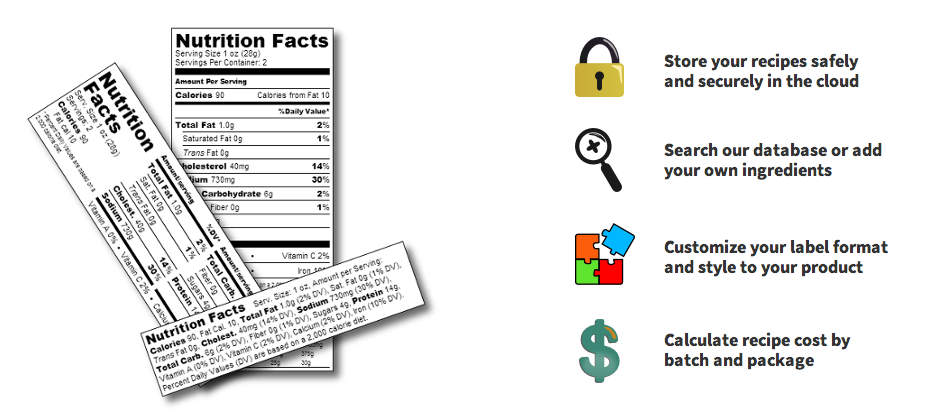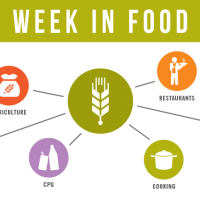For small food producers generating FDA-certified nutrition labels – which are required for business that make nutrient content claims, sell more than $50,000 of food or sell more than $500,000 of food and non-food combined – can prove a challenging task. Available software options, lab analysis and consultants can be cost-prohibitive, time-consuming and limiting in terms of recipe modifications, which makes it difficult for small producers to grow their product lines.
And while the FDA accepts both nutritional analysis from small producers done through outside testing and through in-house database analysis, many math-averted food entrepreneurs find themselves backed into the more costly options. These options take “weeks of turnaround time and [cost] up to hundreds of dollars per recipe,” ReciPal founder Lev Berlin tells me.
Launched in 2011, ReciPal aims to “do the boring nutrition label work and [let food entrepreneurs] get back to what [they] really love” by enabling startups to generate affordable – $19 or less per recipe – nutrition labels in minutes. And ReciPal-generated labels are ready for sale*, as no further certification is required by the FDA. Last week the startup launched a public beta of its API, which allows developers to leverage its technology to create and edit recipes and experiment with ingredients.
The Back Story:
Berlin, financial consultant-turned-developer, began developing the software while working for artisanal jerky startup SlantShack. The small team found FDA labeling regulations indiscernible, but they didn’t have the resources to hire a consultant or send their products to a lab for testing. And online options were “ludicrous”- i.e clunky, desktop-only programs such as Genesis from ESHA Research – which costs about $5,000 – and NutraCoster Professional -which costs $399, says Berlin. Another competitor LabelCalc charges $175 per product and it only allows users one chance to finalize labels, and charges extra for changes, he tells me.
So Berlin created an Excel model for nutrition facts and labeling to save his team time and money, as well as to afford them more recipe flexibility. He then taught himself to program and began plugging away at developing ReciPal.
How It Works:
Users register for ReciPal and can immediately begin creating recipes. The website contains a growing database of 7,000 – 8,000 USDA ingredients, and users can also add supplier nutritional information for custom ingredients that aren’t already in the database. ReciPal does not verify all custom ingredients, as of yet, but it does categorize ingredients so that users are aware of unverified ingredients. Users store their recipes securely in the cloud and access them from any device and have the flexibility to save and edit recipes and customize label formats.
The tool also helps users make pricing decisions. They enter the price they pay for each ingredient, the amount of the ingredient, as well as any packaging, labor and overhead costs, and ReciPal calculates how much the entire recipe batch costs, as well as the cost per package. Additionally, it generates per serving information, the number of servings in each package, and ingredient lists by descending weight order, which are both required by the FDA.
ReciPal currently has thousands of registered users but so far the majority have utilized the free 3-recipe trial, according to Berlin. The startup offers three subscription tiers: $19 per recipe on a one-off basis, $49 a month for unlimited recipes for 1 user and $99 a month for unlimited recipes for multiple users.
The API:
Berlin believes that the new API will make ReciPal a more serious player in the space, hopefully opening up the doors for partnerships with other food tech companies. “There are plenty of companies that already have some recipe creation process within them and have their own applications for that, [but] it’s often quite useful to layer in a nutrition aspect, and better yet, a recognizable and visual nutrition approach like a label,” he says.
The service is garnering interest from smaller meal delivery companies, such as The Good Dish, Power Supply and Plated, Berlin tells me.
Financing & Scaling:
Bootstrapped since its inception, Berlin says he’s not sure ReciPal needs VC backing. The company is almost self sustaining now, and fundraising is not really in the plans. Organic search has helped the company scale to this point, in fact 90 percent of its user growth has been organic or through word of mouth so far, Berlin tells me. He is now focused on reaching out to commercial kitchens and farmers markets, aiming to “get in on the ground where people are building food businesses.”
As for his broader goals, Berlin hopes to one day provide recommendations for how to improve product financials and add a social component that would allow users to validate the nutrition information of their own ingredients through the ReciPal community. In the more immediate future, we’re excited to see what type of traction the startup gets and partnerships it forges through the launch of its API.
* For products which require USDA certification, such as jerky and salami, companies can still use ReciPal for nutrition analysis, but they have to submit their full label to the USDA for approval.






